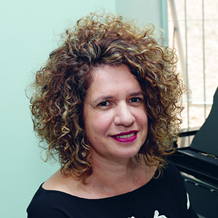Doctorate
Collaborator
NOVA FCSH
Ana Cláudia de Assis is pianist and a professor at the Federal University of Minas Gerais (UFMG) where she develops research and artistic projects on contemporary music. She obtained a PhD in History from the Faculty of Philosophy and Human Sciences at UFMG (in partnership with IPEAT / Université de Toulouse) and Master of Interpretive Practices of Brazilian Music by UNI-RIO. She published the book “The Twelve Sounds and the National Color: aesthetic and cultural conciliations in the musical production of César Guerra-Peixe (1944-1954)”. In 2010, she realized a postdoctoral research about the relationship between the Portuguese composer Fernando Lopes-Graça and Brazilian music, with support from FCT. As an interpreter, she has played all over the world. She participated in important festivals, such as: Brazilian Music Biennial and UFG International Music Festival (Brazil), Monaco Electroacoustique (Monaco), Visiones Sonoras and International Music Festival of Morelia (Mexico), Ai-Maako Festival (Chile), Autumn Festival and Electroacoustic Music Days (Portugal), Skammdegi AIR Award (Iceland) among others. She participated in several recordings, including three solo CDs: César Guerra-Peixe’s Dodecaphonic Music for Piano (2015); Sonorities: contemporary pieces for piano (2016); Vertentes: Brazilian music for piano (2017). Actually, she is developing postdoctoral research on piano music by Jorge Peixinho, with support from the Calouste Gulbenkian Foundation.

